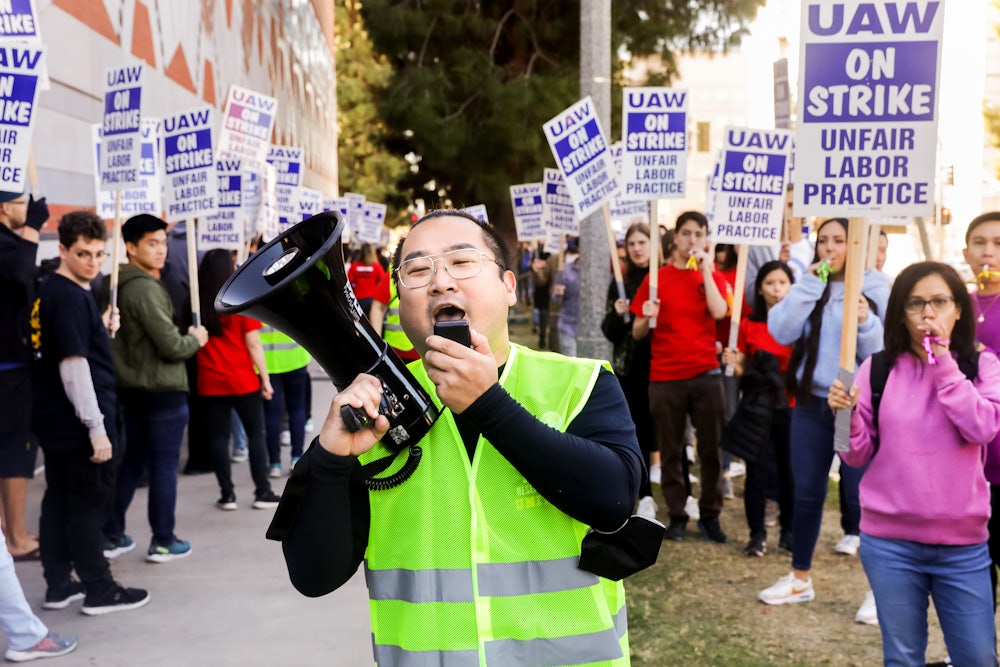Nearly 50,000 graduate students, postdocs, and lab workers went on strike Monday morning at all 10 University of California campuses. The largest strike of 2022 and the biggest academic strike in United States history, it may prove a turning point in the embourgeoisement of America’s labor movement, or what The New York Times has called “The Revolt of the College-Educated Working Class.”
Laugh if you want at the proletarian consciousness of what most Americans consider a privileged class. But lousy wages and working conditions aren’t erased by the promise of a fancy degree and higher wages down the road. And anyway, many of today’s “cultural elite” working at nonprofit, low-profit, or insolvent workplaces at universities, in Congress, at think tanks, in publishing, and in journalism may never earn a living wage without a union. Public schoolteachers learned a long time ago that a saintly dedication to cultivating an enlightened polis does not, by itself, put food on the table. They get reviled for protecting their economic interests, but what do you expect them to do?
Public universities face a unique set of financial pressures arising from state legislatures cutting their budgets over the past two decades to accommodate rising expenditures on health care and mass incarceration. Between 2008 and 2018, according to the nonprofit (and unionized) Center on Budget and Policy Priorities, states reduced per-student spending by 13 percent and jacked up tuition at four-year institutions by 37 percent. Before the 1970s, the University of California was tuition-free for in-state students. But today, they pay $41,052; out-of-state students pay $73,626, which is about what it costs to attend Harvard.
As recently as the 1970s, tenure and tenure-track faculty occupied the majority of all university teaching positions. Today they’re well under one-third, with the slack taken up by graduate students and adjuncts, who (not coincidentally) have been unionizing like mad. Between 2012 and 2020 the number of graduate students who belonged to a union increased by about one-third. Before 2016, grad students at private universities were barred from unionizing by the National Labor Relations Board; the Trump administration tried and failed to reinstate the ban. Grad students at public universities were able to unionize before 2016, but only in states that allowed it, which remains the case. In California, graduate students unionized in 1999.
The California dispute is mainly about wages. The strikers are represented by four unions (all units of the United Auto Workers), and their pay scales differ according to job category. But graduate teaching assistants, for instance, are paid on average $24,000, or $3,750 below the federal poverty line for a family of four. U.C. management is offering $25,680, which would still leave them $2,070 below the federal poverty line. (By comparison, there are U.C. law professors who earn in excess of $500,000 to train students for a profession in financial decline.) The teaching assistants are demanding roughly twice U.C.’s offer. Unsurprisingly, the parties were unable to come to terms before a Sunday midnight deadline, and so the grad students went on strike.
A great irony of the strike is that in a modern university a graduate student walkout is much more disruptive than a tenured faculty walkout could ever be. As of 2020, tenured faculty represented only 16 percent of U.C.’s academic workforce, while student teachers, research assistants, and postdocs represented nearly half. Throw in the other groups that have joined the strike, such as fellows and workers at the Lawrence Berkeley National Lab, and, at about 48,000, that’s probably more than half the U.C. system’s academic workforce. De-tenuring U.C.’s teaching faculty saved money, but it also left U.C. extremely vulnerable to labor disruption.
A principal issue in the strike is housing affordability. Universities are what’s known in the real estate business as “opportunity hubs,” meaning their presence jacks up real estate prices. (The “opportunity” in “opportunity hub” refers to real estate investors, not university employees seeking housing.) According to Redfin, the median home price in Berkeley is $1.5 million, and the median home price in Westwood, the Los Angeles neighborhood where UCLA is situated, is $1.2 million. Cash-strapped universities have increasingly turned this problem into an opportunity by adding local real estate to their portfolios. That feeds ravenous university coffers, but at the cost of jacking local housing costs up further, making it that much harder for grad students to find affordable housing. In Santa Cruz, for instance, former Mayor Chris Krohn complained in August that U.C. Regents bought 163 units at the Hilltop Apartments near downtown and immediately started “emptying the place out and enacting plans to increase rents to what the market will bear.”
According to the strikers, the average grad student worker spends a 52 percent majority of their income on housing. The University of California offers grad students university housing, but less than it used to, the strikers say, pushing them into the “hot private rental market.” And anyway, they say, the student housing isn’t much of a bargain. Management says its rents are 20 to 25 percent below market on average, but the strikers say the discounts are negligible. In Berkeley, for instance, U.C. student housing is $65 per month cheaper than the $1,423 average rent paid by grad students in the private market, according to the strikers, and in Los Angeles it’s $41 cheaper than the $1,454 average. Sometimes there’s no discount at all. In San Francisco and Santa Barbara, the strikers say, U.C. student housing is actually $269 and $50 above the market price.
“They charge graduate student workers $1,400 to $1,700 per month—about 60 to 75 percent of my monthly paycheck,” Natalie Moncada, a student worker and union organizer at UCLA wrote in Jacobin last spring. “To afford the basics of life and to conduct our research in a decent environment, we need a union contract that makes big, enforceable improvements.”
With the leverage U.C. handed them by running its campuses on the cheap, the strikers just may get those big, enforceable improvements. If so, you won’t have to be a scholar of the seventeenth-century literary critic Thomas Rymer, who coined the phrase, to recognize an instance of poetic justice.










